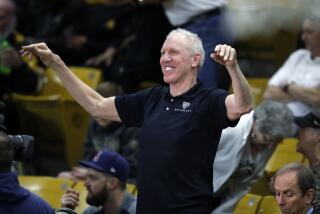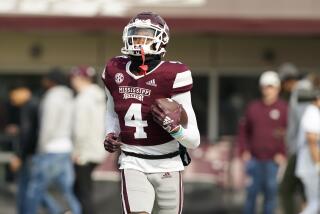Larry Nicholson
- Share via
PHILADELPHIA — The 17-year-old player, a lean 6-foot-4, was hyped up, even though the guys from Girard Academic Music Program weren’t any good. This was his breakout game. He’d boost his scoring average, win some attention from writers, show the college recruiters a thing or two about Larry Nicholson.
And Murrell Dobbins Tech would be a step closer to the high school title that was about the only thing that mattered in his basketball-crazy neighborhood. Next he knew, blood was streaming down a referee’s face and the cops were leading Nicholson out of the gym in handcuffs.
“I know I didn’t just hit him,” he told himself, dazed. “Damn, I just hit the damn ref. What’s going on?”
A year after the punch, which made him the focus of newspaper stories about violence trickling down from professionals to high schoolers, Nicholson is back playing ball, at a community college in Philadelphia.
He is still trying to unravel the tangled consequences of that split-second jab.
“I’ve been thinking to myself, ‘Why’d I do it? What led me to do it?,’ ” Nicholson said this week. “I couldn’t actually come up with no answer to that question. I was just thinking, like, I blew that chance of winning a high school championship, but I didn’t blow my chances of still succeeding, maybe making it to the NBA one day.”
The pressure Nicholson felt that day had been building since eighth grade, when he gave up football for hoops. He enrolled at Dobbins with a single goal in mind: a high school championship.
His junior season increased the pressure a notch. In the semifinals, with a trip to Penn’s 8,700-seat Palestra on the line, he had choked.
“Two points. I went 1-for-10. And fouled out.”
Worse, other players from his neighborhood won the title that year for Thomas Edison High.
“Senior year, I was feeling that I was the man. I was in charge,” he said, his fists clenching at the memory. “Couldn’t nobody stop me. If there was somebody who could stop me, it would be me. Nobody else.”
He scored the first seven points of the game that day when the trouble started. First, a player undercut him on an alley-oop. Minutes later, after a battle for a rebound, referee Ronnie Palmer called a jump ball. Nicholson thought he was fouled and slammed the ball against a wall.
Technical.
“What are you doing?” Nicholson asked Palmer.
A second technical.
Gone.
Nicholson didn’t even realize he had punched Palmer. He glided back to the bench and sat down. The coach told him to get dressed. Embarrassed, he slipped into street clothes behind the bench. He spent eight hours in jail and went home with his father.
Nicholson, banned from Dobbins, would finish his year at a school for students with disciplinary problems. First charged with aggravated assault, he would plead guilty to misdemeanor assault. He was sentenced to four years of probation and 200 hours of community service in a soup kitchen.
He would apologize to Palmer, who needed six stitches to close a gash under his eye.
Repairing his reputation--and his basketball career--will take more than an apology, he knows now. A few Division I schools had been looking at Nicholson, one of the top players in a league that has produced its share of NBA players, most recently Aaron McKie and Rasheed Wallace. The colleges all backed off after the incident.
Last summer, he ran as far from Philadelphia’s gritty streets as he could: rural Coffeyville, Kan., with a population of 12,917, strange storms and a constant stench of fish.
There, he got an elaborate tattoo on his left biceps. “Shed So Many Tears,” it reads.
He immediately broke his jaw. Homesick and itching to play, he transferred to the Community College of Philadelphia, where he got 22 minutes a game and will play for the state title on Sunday.
More important, his academics are improving. A Prop-48 candidate after high school, he got A’s and B’s during his semester at Coffeyville Community College.
“He is clearly the best defensive player I have. I think he’s got Division I talent,” CCP coach Larry Conti said.
Coffeyville coach Jay Herkelman said if Nicholson works on his outside shot and ball handling, he could make it to a low- to mid-level Division I school.
If the big-time schools don’t agree, it appears he’ll get a Division II scholarship after next season.
And when he gets that second chance, he will have a group of strong men to thank for guiding him through last year’s trouble.
“Some of the sports shows, they were killing him,” said Larry Lawhorn, his summer-league coach and mentor. “They were saying he don’t need to play no more basketball, kick him out of school, don’t let him play in college. He’s a good kid. You have to punish him, but don’t try to ruin him.”
Palmer shook Nicholson’s hand at sentencing but has found it hard to totally forgive him. He would not comment about the incident.
Reginald Kitchen, a consultant to pro athletes who helped Nicholson, understands.
“People were asking Ronnie to be objective when he was the subject of the matter,” he said. “That’s a tough thing to do when you’re a grown man and a teen-ager hits you. Over time, he will learn to forgive.”
Lawhorn and Kitchen, meanwhile, have urged Nicholson to learn from the incident.
“When I do think about it now, it has taught me a lot,” Nicholson said. “How to control myself, be patient, let things come to me--before I used to let my anger lash out. . . . All of this paid off.”
Then he thought a second. “But I wish it never happened.”
More to Read
Go beyond the scoreboard
Get the latest on L.A.'s teams in the daily Sports Report newsletter.
You may occasionally receive promotional content from the Los Angeles Times.










